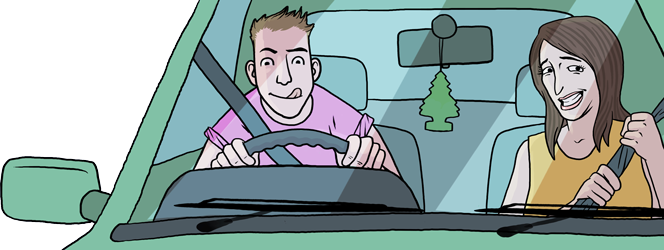
The do’s and dont’s of private practice
Practising driving with your child can be a bit tense. You need to accept that they’re in charge and they need to accept that you know a few things. It’s a weird situation.
So it follows you might need a bit of help on how to approach private practice - some do's and don'ts to help the process go as smoothly as possible.
I can’t promise there won’t be some shouting and tears (probably from you) but hopefully your child will get the most they can from private practice and feel confident when it comes to test time.
Do:
Make sure the insurance is sorted
There's 3 main ways you can insure your child as a learner driver:
- Your child take's out their own short-term learner policy on your car
- Your child take's out their own learner policy on their own car
- You add them as a named driver to your policy
Find out more about the different insurance options for a learner driver.
-
Talk to your child’s driving instructor
Yup, probably embarrassing parent territory but the right thing to do. Make sure the instructor is happy for you to start private practice - too soon would be unsafe.
Ask your child what they've learned so far
They are the person taking the lessons: they know what they know. If they've only learned moving off and turning left, that’s what you should practise.
Start slowly
An empty car park is probably the best place to begin so you don’t have to worry about other people. Without dual controls, you want to be sure it’s safe to move onto the road.
Keep a record of what you've covered
As you get close to test time, you want to be able to tick off each manoeuvre with confidence. A record makes sure you don’t just keep practising your favourites - ignoring the stinkers is more difficult when they’re staring at you from the fridge!
Don’t:
-
Try to teach your child new skills
You’re not trained in explaining complex manoeuvres to stressed teenagers, and attempting it could end in someone getting out of the car and walking home.
-
Override their driving instructor’s methods
You may be a really great driver but you don’t have the latest knowledge of what happens in the test. You need to trust that your child’s driving instructor knows what they’re doing and focus on practising that method. Going against it will cause confusion and inhibit the effectiveness of (expensive) driving lessons.
-
Shout too much
You probably will shout at some point but it’s to be expected when you’re a little worried they’re about to crash into an HGV. Do your absolute best to stay calm and be kind. Learning to drive is hard and can be frustrating but your child will feel much more confident if you show faith in their ability.









